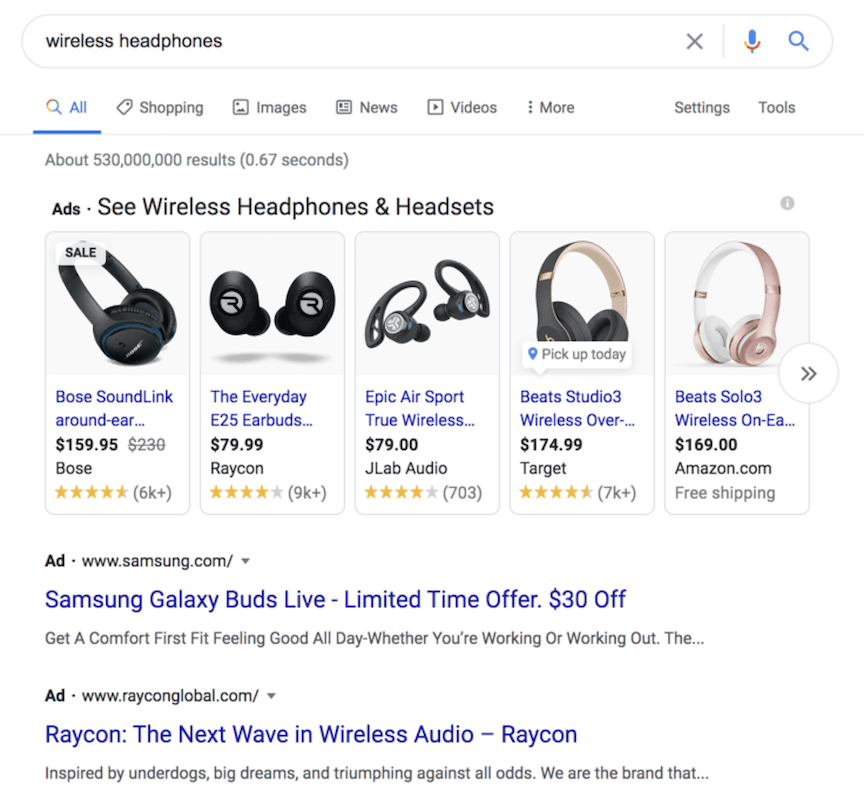-
 6 min. read
6 min. read
-
 Sarah Berry
Sarah Berry Web Marketing Consultant
Web Marketing Consultant
- Sarah Berry is a Google Analytics-certified Web Marketing Consultant at WebFX. She’s written over 400 articles on digital marketing, covering topics like SEO, CRO, and Amazon. When she isn’t polishing her Time Magazine Person of the Year Award, she’s spending time with her flock of ducks.
Update: Starting in February 2021, Google began phasing out modified broad match for Google Ads. Check out what Google Ads match types are available to you.
Keyword matching is an essential part of setting up a successful Google Ads campaign since it controls where your ads appear. Google offers several options when it comes to keyword matching.
One useful option is broad match modifiers, or BMM. This setting allows your ad to show for close variations of your keywords but gives you more control over the searches for which your ad displays than the default keyword match setting. Want to learn more about broad match modifiers for Google Ads, why you should use them, and how to set them up?
Then, keep reading! For more insights and tips from our team of online marketing experts, sign up for our email newsletters! Over 90% of WebFX clients continue partnering with us into year 2 of their campaign.We foster and form long-term partnerships so that your business has long-term results.


What is a broad match modifier?
Broad match modifiers are an advanced keyword matching option for Google Ads.
They function similarly to the default broad match type, but give you a bit more control. The broad match setting allows your ads to show for your exact keywords, as well as synonyms, misspellings, related searches, and other variations of your keywords. Broad match modifiers let you choose keywords that must appear in the search for your ad to show.
The ad also shows for close variations of the keywords you mark as essential. Close variants include:
- Misspellings
- Abbreviations
- Acronyms
- Different grammatical forms of the word
- Synonyms
- Paraphrases
To mark a keyword as essential, you place a plus sign (+) before the word.
Broad match modifier examples
Let’s take a look at some broad match modifier examples. Let’s say the keyword phrase you’re targeting is “hiking boots.” With regular broad match, your ads might show for the searches “hiking boots,” “hiking shoes,” and “boots.” If you use the broad match modifier option for that same phrase and mark “hiking” as essential, your ad will show for “hiking boots” and “hiking shoes.” It will not show for just “boots” since that search doesn’t include the term “hiking.” As another example, let’s say your target keyword phrase is “+wireless +headphones.” In this example, you’re using broad match modifiers, and both terms must appear in the search for your ad to show. Your ad would show for these searches.
- Wireless headphones
- Cheap wireless headphones
- Wireless earbud headphones
It would not display for these searches since they don’t contain all the required keywords.
- Over-ear headphones
- Wireless speakers
- Headphones

Why use broad match modifiers?
The broad match modifier keyword match type gives you more control over who sees your ads and where your ad spend goes, compared to the default broad match option. However, you still get the benefit of showing up for closely related searches, so you don’t have to think of every possible keyword variation. Broad match modifier is an excellent middle ground for how narrow the audience you reach is.
You can reach a broader audience than with the exact match or phrase match options, but you can narrow down your audience more than you can with regular broad match. Because you reach a more targeted audience, you may achieve a higher click-through rate (CTR) on your ads. You also increase your visibility as compared to exact match and phrase match.
How to use broad match modifiers
To use broad match modifiers, add broad match keywords as you normally would in Google Ads but place a plus sign in front of the words you want to make into broad match modifiers.
For your ads to show for a given search, the search must contain the words with a plus sign in front of them or a close variation of those words. Your broad match modifiers should look like this:
- +dog +sweaters
Don’t put a space between the plus sign and the word you want to modify. If you place a plus sign in front of one term but not another in your keyword, the one with a plus sign will be a broad match modifier, and the other will be a broad match. Consider the following keyword phrase.
- Holiday +dog +sweaters
In this case, “dog” and “sweaters” are essential for your ad to show. You’re targeting “holiday,” but your ad will also show for “sweaters for dogs” and other similar searches that don’t contain the word “holiday.” It’s also important to note that broad match modifiers only work with broad match keywords. There’s no equivalent for phrase match or exact match — two other keyword matching types.
However, you can use multiple match types within one campaign. If you’re using exact match or phrase match keywords and want to expand your reach with broad match modifier keywords, create a separate ad group. Then, create a broad match modifier version of your exact or phrase match keywords.
For example, if your exact match keyword is “travel coffee mug,” your broad match modifier keyword would be “+travel +coffee +mug.”
Step-by-step instructions for setting up broad match modifiers
For more detail about how to set up broad match modifiers in Google Ads, check out these step-by-step instructions.
- Log into your Google Ads account
- Select “Keywords” from the menu on the left side of the page
- Click on the blue plus sign button
- Choose the ad group to which you want to add your broad match modifiers
- Enter your broad match modifier keywords and remember to include the plus sign in front of the keyword
- Click the “Save” button
Your ads will now run with your broad match modifier keywords. If you want to update an existing broad match keyword to include a broad match modifier:
- Log into your Google Ads account
- Select “Keywords” from the menu on the left side of the page
- Hover over the keyword you want to edit and click on the pencil icon
- Add a plus sign before the words you want to change to broad match modifiers
- Click the “Save” button
Optimize your Google Ads campaigns with WebFX
Choosing the right keyword matching settings is crucial for any Google Ads campaign, but many other elements go into a successful strategy as well. If you want expert assistance in making the most of your ad spend, consider working with WebFX. We’re an experienced Google Ads agency and a Google Premier Partner, and we can develop and implement a custom pay-per-click (PPC) advertising strategy that maximizes results for your business.
To learn more about our Google Ads services, call us at 888-601-5359 or request a free quote online today!
-
 Sarah Berry is a Google Analytics-certified Web Marketing Consultant at WebFX. She’s written over 400 articles on digital marketing, covering topics like SEO, CRO, and Amazon. When she isn’t polishing her Time Magazine Person of the Year Award, she’s spending time with her flock of ducks.
Sarah Berry is a Google Analytics-certified Web Marketing Consultant at WebFX. She’s written over 400 articles on digital marketing, covering topics like SEO, CRO, and Amazon. When she isn’t polishing her Time Magazine Person of the Year Award, she’s spending time with her flock of ducks. -

WebFX is a full-service marketing agency with 1,100+ client reviews and a 4.9-star rating on Clutch! Find out how our expert team and revenue-accelerating tech can drive results for you! Learn more
Try our free Marketing Calculator
Craft a tailored online marketing strategy! Utilize our free Internet marketing calculator for a custom plan based on your location, reach, timeframe, and budget.
Plan Your Marketing Budget

Maximize Your Marketing ROI
Claim your free eBook packed with proven strategies to boost your marketing efforts.
Get the GuideTry our free Marketing Calculator
Craft a tailored online marketing strategy! Utilize our free Internet marketing calculator for a custom plan based on your location, reach, timeframe, and budget.
Plan Your Marketing Budget





